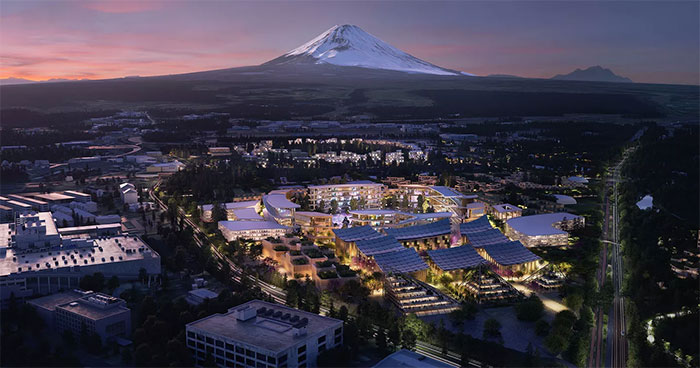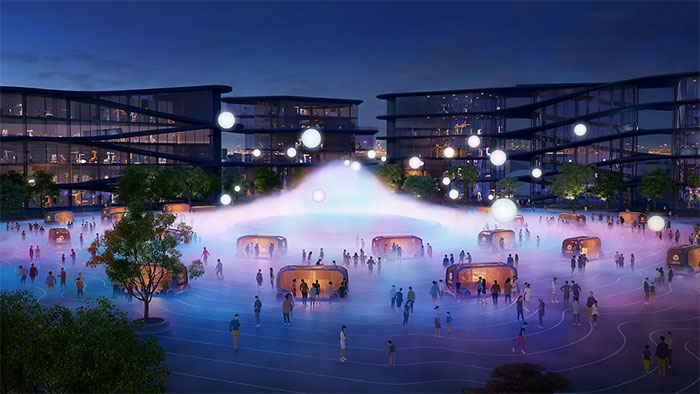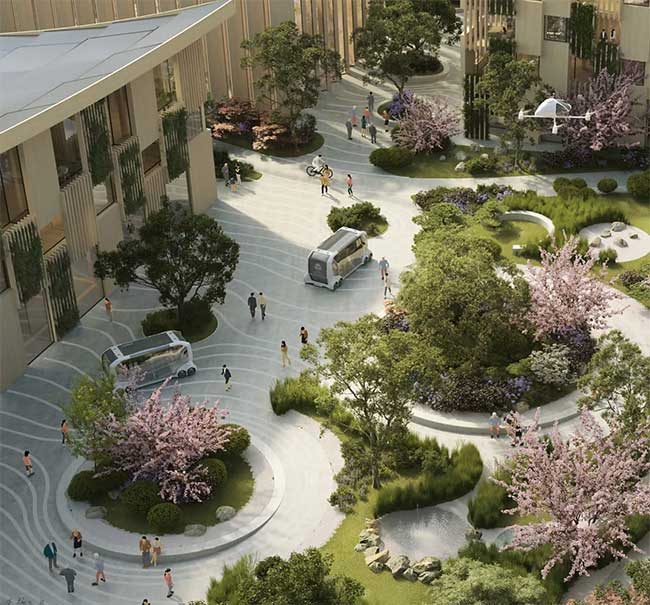At the foot of the volcano, Toyota built a billion-dollar 'base' for 2,000 people: Residents are treated in an unexpected way!
After 3 years of construction, this "home base" is about to welcome its first residents.
First announced in 2021, Toyota - the world's best-selling automaker - is showing huge ambitions as it is about to finish building an unimaginable sustainable city at the foot of an active volcano. in Japan.
That is Woven City. At the foot of Mount Fuji.

Toyota's future city.
This megacity will be a fully autonomous community, aiming to test new technologies such as autonomous driving, robotics and artificial intelligence (AI) in real-world environments, Forbes reported.

Photo: Toyota/Woven City
It is expected that by the end of 2024, Woven City will welcome about 360 of its first residents. Finally, its official population is 2,000 people . In 2025, Toyota will conduct initial tests.
According to information from Wonderfulengineering , Woven City is worth billions of US dollars.

Photo: Toyota/Woven City.
Toyota said, Woven City is 708,000 square meters wide . This megacity is considered Toyota's "living laboratory" to test reusable and energy-efficient self-driving vehicle prototypes, thereby helping to expand mobility and unleash potential. of human.
The automaker plans to collect massive data sets from using driverless cars guided by sensors in city lights, buildings and roads, to help it understand more about traffic patterns of both cars and pedestrians.

Photo: Toyota/Woven City
This connectivity will allow Toyota to test how advanced AI technology works in the real world with minimal risk.
The city's fully connected ecosystem is powered by clean energy sources such as solar power, hydrogen fuel cells and geothermal energy.

Photo: Toyota/Woven City
Woven City is also expected to feature "smart homes" that run almost entirely on hydrogen, helping to reduce emissions to make this unique megalopolis as sustainable and environmentally friendly as possible.
Residents of this future city will be transported by automated cars, and live in an emissions-free environment. Every item is equipped with top technology.

Photo: Toyota/Woven City
Akio Toyoda, President and CEO of Toyota (who will step down on April 1, to become Chairman of the Board of Directors) said: "Building a complete city with a sensor system from the beginning, Even at this small scale, there is a unique opportunity to develop future technologies, including digital operating systems for city infrastructure.
With people, buildings and vehicles all connected and communicating with each other through data and sensors, we will be able to test connected AI technology in both the virtual and physical world, to maximize its potential".

Illustration photo: Copilot
In addition to this advanced technology, most buildings in Woven City will be built in traditional Japanese style from wood. That means, even these manual techniques will be performed by robots specially programmed to do the heavy labor, completely replacing humans.
Experts predict that, by 2040, more than 33 million autonomous vehicles will be sold globally – but today, even the most advanced self-driving cars still require some level of human supervision. some degree.

By 2040, it is forecast that more than 33 million autonomous vehicles will be sold globally. Photo: Copilot
To fully adopt self-driving cars, cities need to be fully connected to transmit huge amounts of data to vehicles. Sensors and cameras scattered throughout roads, traffic lights and buildings can feed that data to cars, including everything from weather patterns to cyclist behavior. Once self-driving cars have that data, they can process it and use it to safely navigate the city.
Currently, modern cities are not set up this way – and that's why Toyota is building a sensor-filled Woven City from the ground up.
News that the Woven City project is about to be completed appeared not long after photos of the progress of Saudi Arabia's giant "mirror city" project The Line were shared.
Woven City: Toyota's future city. (Source: Toyota).
- Volcano sprayed ash column 5,000 m
- 33 interesting facts of USD power currency
- Toyota introduces hard-disk batteries in Japan
- The 'Dollar' is named after the grandfather of Jesus
- Toyota makes solar powered vehicles
- Toyota safety system can feel pedestrians, avoid accidents
- New USD 100 official note circulating in the world
- Video: The disaster when the volcano on the island of Bali wakes up
- Volcanoes can 'wake up' in 2012
- Indonesian volcano sprayed 8,000 meters of smoke ash
- Toyota registered a patent for A-cylinder cars can see through
- NASA built a human base on the Moon with this $ 6 million vehicle
 'Fine laughs' - Scary and painful torture in ancient times
'Fine laughs' - Scary and painful torture in ancient times The sequence of numbers 142857 of the Egyptian pyramids is known as the strangest number in the world - Why?
The sequence of numbers 142857 of the Egyptian pyramids is known as the strangest number in the world - Why? History of the iron
History of the iron What is alum?
What is alum? The Great Underground Constructions of the Ancient World
The Great Underground Constructions of the Ancient World  Ho Chi Minh City is among the top 5 fastest sinking cities in the world.
Ho Chi Minh City is among the top 5 fastest sinking cities in the world.  Returning from the White City, the expedition team contracted a terrifying disease.
Returning from the White City, the expedition team contracted a terrifying disease.  What secrets do the Inca ruins of Machu Picchu hold?
What secrets do the Inca ruins of Machu Picchu hold?  Ho Chi Minh City will test 100km/h unmanned flying vehicle
Ho Chi Minh City will test 100km/h unmanned flying vehicle  Nearly 6,700 Maya 'ghosts' revealed in Mexico
Nearly 6,700 Maya 'ghosts' revealed in Mexico 